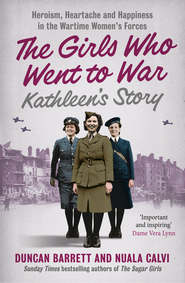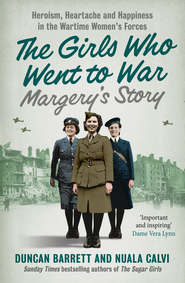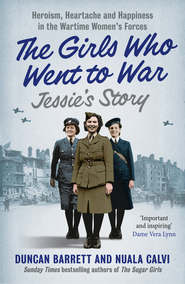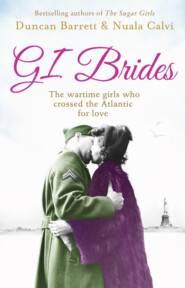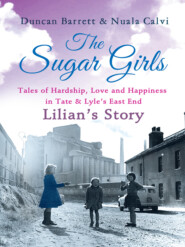По всем вопросам обращайтесь на: info@litportal.ru
(©) 2003-2024.
✖
The Sugar Girls: Tales of Hardship, Love and Happiness in Tate & Lyle’s East End
Настройки чтения
Размер шрифта
Высота строк
Поля
Her dad grinned with satisfaction. ‘What do you think? Go down Tate & Lyle’s like everyone else.’
On Monday morning, Gladys found herself outside the Personnel Office at the Plaistow Wharf Refinery. A shiny new sign on the door read: MISS FLORENCE SMITH, LABOUR MANAGERESS.
Gladys knocked reluctantly and a deep voice issued from the other side of the door. ‘Come in.’
Inside the pokey little office, three women were seated behind a single long table. In the centre was Miss Smith, a huge, broad-shouldered boulder of a woman with a stern, matronly look. Her blonde hair was cut in a short, severe crop, and her grey suit and white blouse were buttoned up so tight over her enormous bosom that it was a wonder she could breathe. She was a recent appointment to the top woman’s job at the factory, although no one who met her would ever have guessed.
The other two women in the office were both called Betty. To Miss Smith’s left was the young Personnel secretary, Betty Harrington, and on her right sat her deputy, Betty Phillips, a thin woman with glasses.
Miss Smith nodded to a chair opposite the three of them. ‘Sit down,’ she ordered.
Gladys slumped into the seat. Miss Smith took in her boyish frame and messy ginger hair. ‘Have you left school yet?’ she asked suspiciously.
‘Yeah, of course,’ Gladys retorted.
‘Name? Address?’
‘Gladys Taylor, 38 Eclipse Road, Plaistow.’
Miss Smith scribbled on a white form.
‘Do you have a letter of recommendation?’
Gladys fished around in her pocket and handed over a crumpled piece of paper. Miss Smith read the headmaster’s carefully chosen words.
‘Well, that’s certainly concise,’ she said, handing it back.
What a cow, thought Gladys, stuffing the paper back into her pocket.
‘And why did you wish to work at Tate & Lyle in particular?’
‘I didn’t really,’ Gladys said, before she could stop herself. The two Betties shuffled nervously in their seats.
Miss Smith looked up from her form and glared at Gladys. ‘I have four rules in this factory,’ she said. ‘No make-up, no jewellery, no swearing – and no cheek. Is that understood?’
‘Yes, Miss,’ muttered Gladys, beginning to feel she had walked straight out of one headteacher’s office and into another.
‘Good. I think we’ll start you in the Blue Room and see how you fit in there.’ Gladys could have sworn she saw a glint in Miss Smith’s eye. ‘You’ll be on six-to-two one week and two-to-ten the next. Report to the gate at six a.m. sharp tomorrow and ask for Julie McTaggart. She’ll be your charge-hand.’
Six a.m.? Gladys was horrified. But before she could protest, Miss Smith had stamped the form and handed it to one of the Betties for filing.
Gladys’s first week at Tate & Lyle made her school record look flawless by comparison. On Tuesday morning she was woken by her mother at four-thirty a.m. ‘Your shift starts at six – you’d better be quick,’ Rose said, shaking the snoring bundle under the sheets.
‘Can’t,’ Gladys protested.
‘Well, you’ll be on two-to-ten next week – you can sleep then,’ said her mother, plonking a bowl of bread and hot milk down next to her.
Gladys dragged herself into a sitting position and slurped her breakfast down. She grabbed the nearest available clothes and put them on, before attempting to pull a comb through her unruly red hair.
‘Time to go or you’ll miss your bus!’ called her mother. Gladys gave up the battle with her hair and ran down the stairs, passing her father as she went. ‘Have fun!’ he chuckled, and she gave him a scowl.
From Eclipse Road it was only a couple of minutes’ dash to the bus stop, where Gladys hopped on the back of a 175 trolleybus along the Beckton Road. At Trinity Church she caught a second bus, the 669 to North Woolwich, which she knew would drop her at the gates of the factory.
The bus travelled down the Barking Road, passing Woolworths, the men’s outfitters Granditers and the women’s clothes shop Blooms. They went by the corner of Rathbone Street, home to the area’s thriving market, where anything and everything could be bought for the right price, from eels still wriggling in their buckets and freshly beheaded chickens to broken biscuits, soaps made from the pressed-together pieces collected from hotel bathrooms, and steaming cups of sarsaparilla.
At the end of the high street, the bus turned left onto Silvertown Way, passing the Liverpool Arms pub and the Imperial cinema as it began the gentle climb up to the familiar twin protractors of the Silvertown Viaduct, which crossed over the railway lines heading further east. It was here that Winston Churchill had stood during the early days of the Blitz to survey the horrors meted out on the dockside community, and from the same vantage point seven years later Gladys could see the extent of the devastation suffered in her former stomping ground of Tidal Basin. The area had been virtually flattened, and the old Victorian dwellings were now being replaced with the modern flats and houses of the Keir Hardie Estate, the most ambitious building project in West Ham’s history.
As the road dropped down towards Silvertown, the great expanse of the Royal Victoria Dock stretched out to her left, where the giant ships unloaded cargo from all over the world. She passed the lock that linked the dock to the Thames, and then suddenly they were in the heart of industrial West Silvertown, with British Oil and Cake Mills, Pinchin Johnson’s paint factory and Ohlendorff’s fertiliser plant spewing out smoke from their giant chimneys. A swarm of shift workers was descending on the factories lining the river on her right, and on her left was the parade of little shops and cafés that served the local community, as well as the Jubilee pub where many a Tate & Lyle worker celebrated the week’s end. Before long she could see the refinery itself, and the bus conductor called out, ‘Tate and Lyle, Plaistow Wharf. Disembark here for the knocking shop!’
A peal of gruff laughter went around the bus, which was largely filled with dockers and factory men, among whom Tate & Lyle had something of a reputation for promiscuity.
But one young sugar girl on the bus was not amused. ‘Excuse me, mate,’ she shouted angrily, ‘I work there and I’m not a tart, so I think you ought to shut your mouth!’
There was another roar from the crowd, this time of approval for the plucky teenager. The cowed conductor muttered an apology, before the tough young woman marched off the bus. Gladys followed close behind, a little in awe.
Near the bus stop was a coffee stall and newspaper stand where the workers were picking up their morning’s necessities. The crowd thronging towards the gates of Tate & Lyle was particularly heavy, but amid the bustling movement one man stood perfectly still. He was a slim, elegant-looking fellow in a pale mackintosh, with grey hair slicked back across his scalp, and he stood scribbling in a little notebook.
His name was Bob Tyzack and he had never got over being given the sack from Tate & Lyle. He stood outside the factory day in, day out, noting down the lorries coming and going, for reasons known only to himself. This was particularly awkward for his brother Bill, the head commissionaire, who was charged with making sure he never stepped onto the factory grounds. The Tyzacks were a well-known Tate & Lyle family, and their name was soon to become famous across the country when Bill’s niece Margaret became a film star.
Gladys headed across the road with the rest of the throng. She looked up at the big white clock above the factory gates, which read two minutes to six: she wasn’t late yet.
Suddenly a collective groan went up from the crowd – a train was about to pass along the tracks in front of the gate. They waited impatiently for it to go through. ‘That’s it, we’ll be docked a quarter of an hour’s pay now!’ grumbled one girl.
Gladys turned to her. ‘But the train won’t take that long, will it?’
‘Don’t matter,’ said the girl. ‘You’re even one minute late here, they close the gate and make you lose 15.’
This harsh rule prompted some Tate & Lyle workers to risk their lives by scrambling under the trains as they slowed down, and stories went round the factory of the injuries suffered by those who had miscalculated.
When the gates finally reopened there was a great rush towards a board on the wall, where clocking-in discs were waiting on hooks to be collected and taken to the various departments. Gladys was almost knocked over in the fray, but fought her way to the commissionaire and asked for the Blue Room charge-hand, Julie McTaggart.
Before long, she saw a stern-looking woman with very dark hair marching towards her, hands clasped firmly behind her back.
‘Gladys Taylor?’
Gladys nodded.
‘You’re late.’
Defiance welled up in Gladys’s chest. ‘It weren’t my fault,’ she retorted. ‘It was the train. Silly place to put it, if you ask me.’
Julie looked at her straight-faced. ‘I didn’t.’
They headed to the surgery, where a nurse checked Gladys over and passed her fit for work. Then Gladys followed Julie into another building. ‘We’re in here, underneath the syrup-filling,’ Julie said, leading her into a cloakroom and pushing a bundle of clothing into her hands. ‘Don’t be long.’ The door swung closed, leaving Gladys alone in the little room.
She laid out the pile of clothes on a wooden bench: a pair of dark-blue dungarees and a blue-and-white checked blouse – plus a spare set of each. Like going into the bleedin’ Army, she thought ruefully.
Gladys changed into her new uniform. The dungarees hung loosely on her boyish frame, the crotch resting somewhere down by her knees and the backside looking like a crumpled sack waiting to be filled with potatoes. The short-sleeved blouse seemed to have been designed with a buxom matron in mind, and one with arms as thick as her legs, not a skinny, flat-chested 14-year-old. What kind of monstrous creatures worked in this Blue Room?






